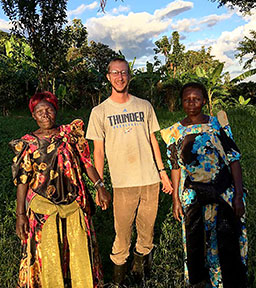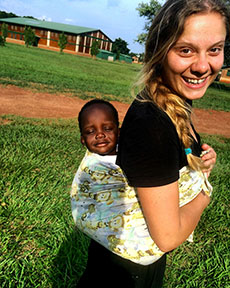Master of International Agriculture students return from Uganda
Friday, September 2, 2016
Agriculture is universal. The methods, available technologies and products are not all the same, but the mission remains: put food on the table.
Sometimes that table is not their own. Sometimes that table is not in their own town, state or even country. But farmers and agricultural educators know no borders.
Two Oklahoma State University Master of International Agriculture Program students recently returned from their trips to Uganda. Tanner Roark and Gabriella Bragoli were each named Noble Foundation/MIAP Fellows, a distinction that led them down a path of unforgettable experiences.
“This is a prestigious fellowship that each semester allows only one MIAP student to be selected to travel to Uganda,” said Shida Henneberry, MIAP director. “We are looking for students who have agricultural production and marketing skills, as well as students who are interested in agricultural education and are able to construct a curriculum, teach it and pass it on to the next person.”
Both Roark and Bragoli fit that billing.
“I wanted to go to Uganda because I am curious,” said Roark. “I wanted to work alongside
and exchange ideas with smallholder farmers on the other side of the world. I wanted
to work with innovative farmers who don't get the credit they deserve and do my best
to amplify their voices.”


Smallholder farmers are those that rely mainly on family labor. In developing countries, this accounts for the majority of agricultural production.
The students worked in agricultural farms of Watoto Child Ministries to help improve food production volume and quality, as well as preservation. They also helped in pricing and marketing the excess supply for efficient market allocation and profit maximization.
“I was there with a focus on agricultural education and managing a small student garden. The purpose of this curriculum was to empower and educate students, but also to help shift the perception that often surrounds agriculture in developing communities,” Bragoli said. “The goal is to shift the line of thinking away from subsistence and moving toward viewing agriculture as a lucrative means of income, a viable career path and an important factor in the development and progress of Uganda.”
Every MIAP student is required to have a meaningful international experience of at least four weeks and this fellowship is an effective way to fulfill this requirement. Both students spent more than eight weeks in Uganda and shared their knowledge with the locals, but just as importantly, brought home a different perspective of the world they live in.
“I spent a week in Kasejjere village in rural Uganda, where I was treated like family,” Roark said. “This community was full of innovative farmers that used indigenous knowledge and farmer-to-farmer exchanges to build farmer autonomy, something that is desperately needed.”
Bragoli also noted the family-like atmosphere.
“I was truly moved by the intentional and hospitable nature of Ugandans. It was wonderful to see firsthand that smallholder farmers are progressive, exceptionally knowledgeable and always in search of new answers,” she said. “There’s no lack of creativity and ingenuity in the developing world. Solutions that I struggled to see were apparent to the farmers and students I was with. I am so grateful for the insight into Ugandan culture and my time there has left me in search of new experiences and with a deep love for the Pearl of Africa.”
Roark and Bragoli were selected based on their qualifications and skills. Every student selected submits a budget and they are awarded a travel grant from the Humphreys Endowed Chair, currently held by Henneberry, which is in the area of food security and international agricultural and rural development.
The Noble Foundation also provides a stipend to the students.
“The Fellows have had a significant impact in betterment of the lives of children and adults they have worked with in Uganda,” said Henneberry.
